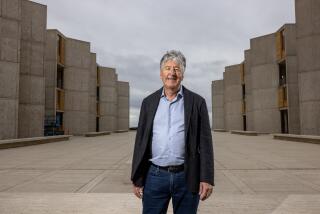Leading Scientist Chosen to Fill AIDS Research Chair at UCSD
- Share via
One of the nation’s leading researchers on acquired immune deficiency syndrome has been chosen as the first recipient of the Florence Seeley Riford Chair for AIDS Research at UC San Diego, a university spokesman announced Wednesday.
Flossie Wong-Staal, a researcher at the National Cancer Institute in Bethesda, Md., on Monday will join the departments of biology and medicine, UCSD Chancellor Richard C. Atkinson said.
The position was made possible through the sale of commercial real estate donated to the university by La Jolla philanthropist Florence Seeley Riford in 1986 expressly for AIDS research, Atkinson said.
During much of her 16-year tenure at the institute, Wong-Staal worked closely with Robert Gallo, credited with co-discovering HIV, the virus that causes AIDS. She cloned HIV in 1984 and was the first to analyze its molecular makeup. Her pioneering work helped to reveal for the first time the complexity of the AIDS virus, Atkinson said.
Wong-Staal earned her doctorate in molecular biology at the University of California, Los Angeles in 1972 and then spent a year doing postdoctoral research at UCSD.
At UCSD, Wong-Staal plans to set up a collaborative program to develop vaccines against the AIDS virus and continue her studies of the genes that regulate the reproduction and activity of the virus, Atkinson said.
She will work with molecular biologists, virologists, immunologists in biology and researchers in the School of Medicine. She will also bring a seven-member research team, he said.
“Flossie Wong-Staal is an outstanding scientist who leads one of the country’s most important and exciting programs in human immunodeficiency virus research,” said Gerard N. Burrow, vice chancellor for health sciences at UCSD.
“Many of the nation’s leading institutions were interested in recruiting her, so her decision to move to UCSD is a real testimony to the caliber of the scientific research taking place in this community,” he said.
More to Read
Sign up for Essential California
The most important California stories and recommendations in your inbox every morning.
You may occasionally receive promotional content from the Los Angeles Times.











